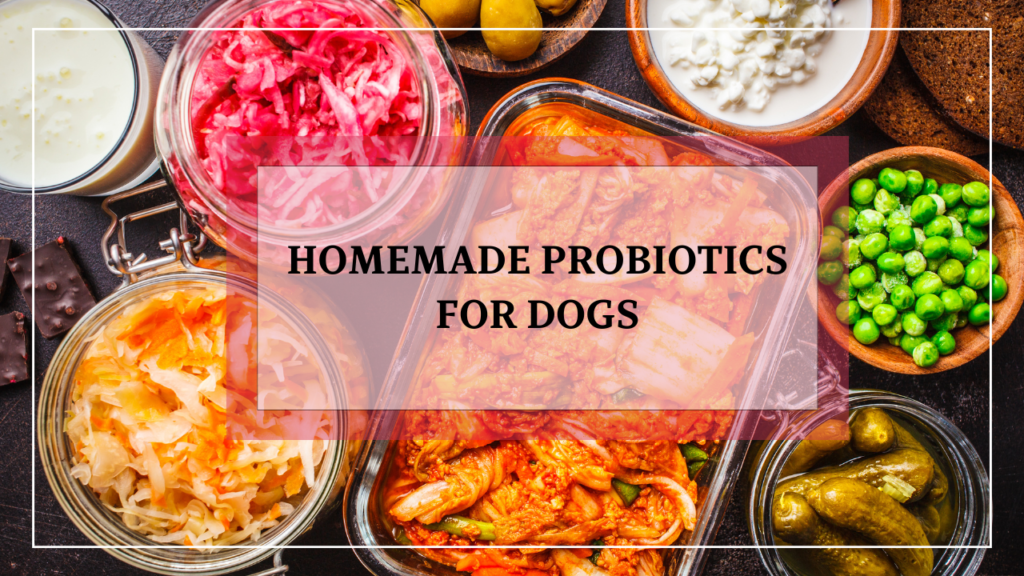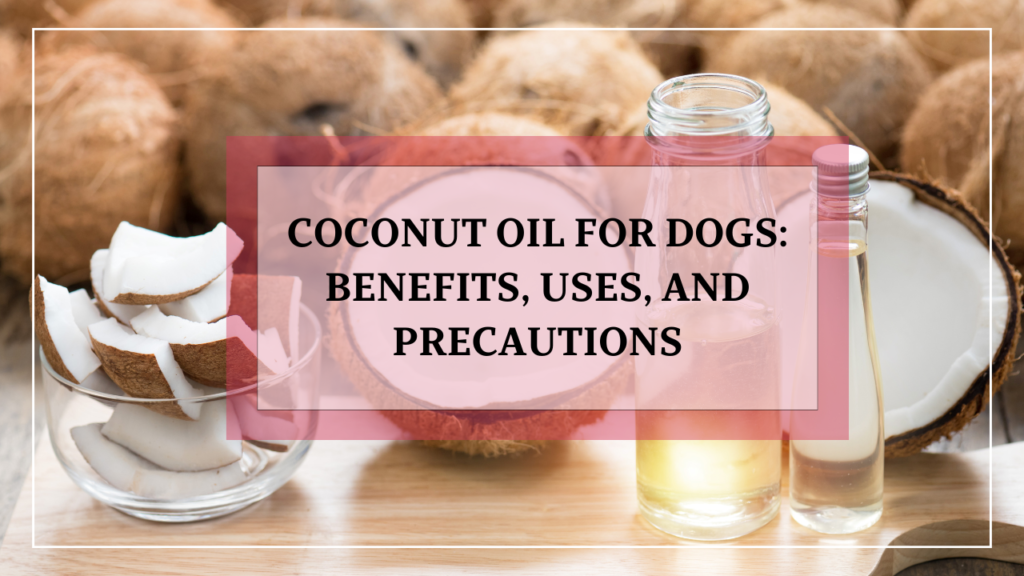When it comes to your dog’s health, the saying “you are what you eat” holds true even for our furry companions. Probiotics—known as the “good bacteria”—play a critical role in maintaining a healthy digestive system and improving overall well-being. While store-bought options are widely available, homemade probiotics for dogs offer a natural, cost-effective, and customizable way to improve your dog’s gut health without the need for artificial additives or preservatives.
In this guide, we’ll explore what probiotics are, why they’re essential for dogs, and how you can prepare safe and effective DIY probiotics at home. You’ll also learn about the signs your dog may benefit from probiotics, various homemade recipes, and the potential risks to keep in mind. Whether you’re a seasoned dog owner or new to the world of canine probiotics, this article will provide you with all the information you need to give your pup the best care possible.
What Are Probiotics for Dogs?
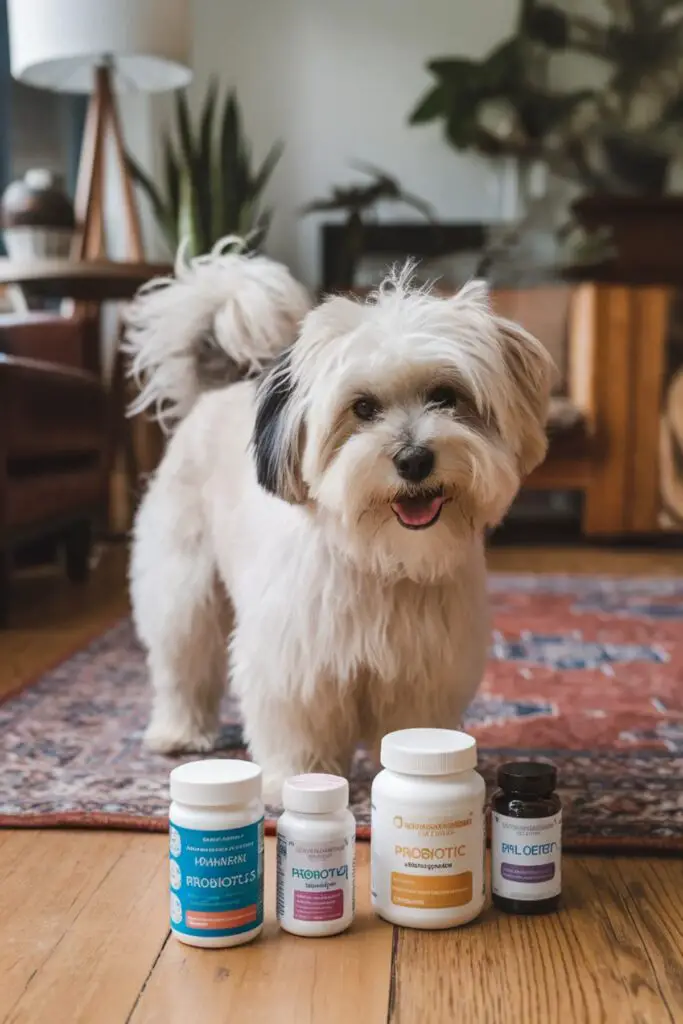
Probiotics are live microorganisms, often referred to as “good bacteria,” that provide a wide range of health benefits when consumed in adequate amounts. For dogs, probiotics primarily target the gut, where they help balance the microbiome—a community of bacteria and other microbes that play a key role in digestion, immune function, and overall health.
Definition of Probiotics
Probiotics are beneficial bacteria or yeast that help maintain or restore the natural balance of organisms in the gastrointestinal tract. They are not only critical for digestion but also influence other systems in the body, such as the immune and nervous systems.
In dogs, common probiotic strains include:
- Lactobacillus acidophilus: Supports digestion and reduces diarrhea.
- Bifidobacterium animalis: Helps improve stool quality and consistency.
- Enterococcus faecium: Assists in nutrient absorption and promotes gut health.
- Saccharomyces boulardii: A yeast probiotic that combats harmful pathogens.
How Probiotics Work in a Dog’s Body
Probiotics work by introducing beneficial bacteria that compete with harmful microbes in the gut. This competition helps:
- Restore Microbial Balance: Probiotics replenish beneficial bacteria that may be depleted due to stress, illness, or antibiotic use.
- Aid Digestion: They help break down food, absorb nutrients, and reduce gas or bloating.
- Strengthen the Immune System: Around 70% of a dog’s immune system is in the gut, and probiotics enhance its ability to fight infections.
- Prevent Overgrowth of Harmful Bacteria: By maintaining a balanced microbiome, probiotics reduce the risk of infections like diarrhea caused by pathogens such as Clostridium difficile or Salmonella.
Signs Your Dog May Need Probiotics
Your dog’s gut health directly affects their overall well-being. If the following signs appear, probiotics could make a noticeable difference:
- Digestive Issues: Chronic diarrhea, constipation, bloating, or gas.
- Skin Problems: Allergies, itchiness, or recurring infections may stem from an unhealthy gut.
- Stress-Related Symptoms: Travel, changes in routine, or separation anxiety can disrupt the gut microbiome.
- Antibiotic Use: Antibiotics often wipe out good bacteria along with bad, creating a need for probiotics to restore balance.
- Poor Appetite or Lethargy: A lack of energy and interest in food may indicate poor nutrient absorption.
Case Study:
A 5-year-old Labrador Retriever with recurring skin allergies and inconsistent stool was introduced to a diet rich in probiotics. Within three weeks, the dog’s skin improved, itching reduced, and stools became more regular. The veterinarian attributed this improvement to the probiotics stabilizing the dog’s gut microbiome.
Quick Fact Table: Benefits of Probiotics for Dogs
| Benefit | Explanation |
| Enhanced Digestion | Improves nutrient breakdown and absorption. |
| Reduced Allergies | Mitigates inflammatory responses linked to poor gut health. |
| Stronger Immune System | Boosts the body’s defense against infections. |
| Better Stool Quality | Helps with consistency and reduces unpleasant odors. |
| Stress Management | Calms the gut during anxiety-inducing events, such as travel or thunderstorms. |
Best Homemade Probiotic Sources for Dogs
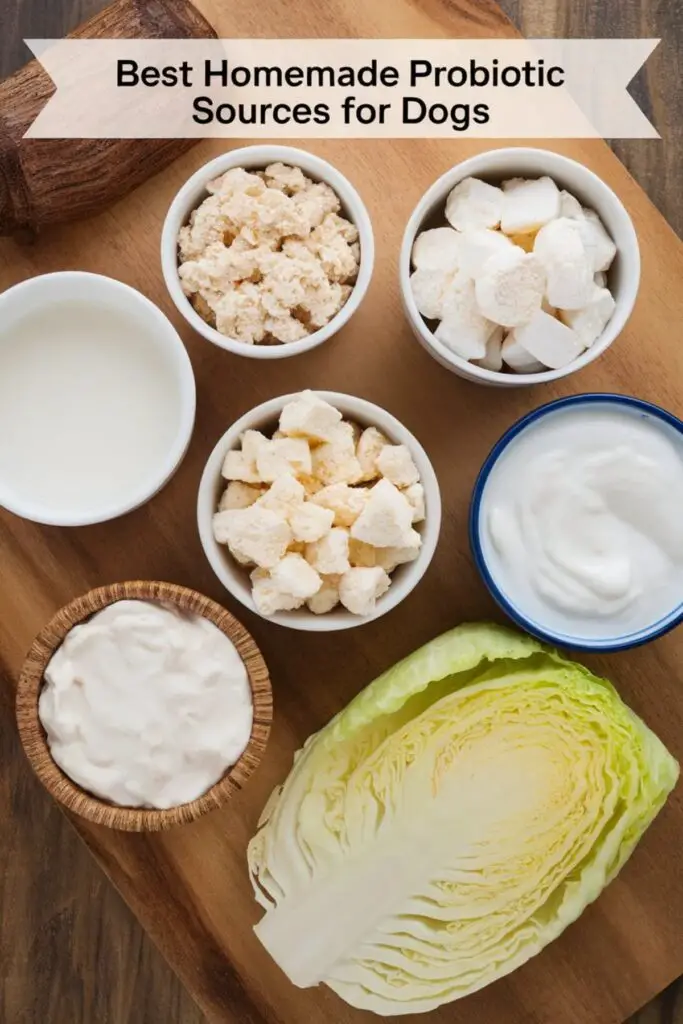
A healthy gut is essential for a dog’s overall well-being, and probiotics play a crucial role in maintaining a balanced microbiome. Homemade probiotics offer an affordable and natural way to support your dog’s digestive health while avoiding artificial additives found in some commercial supplements. Below, we explore the best homemade probiotic sources for dogs, detailing their benefits, how to use them effectively, and important safety considerations.
1. Yogurt and Kefir

Why It’s Beneficial:
Both yogurt and kefir are rich in live active cultures such as Lactobacillus and Bifidobacterium, which promote a healthy digestive system. These probiotics help break down food, enhance nutrient absorption, reduce bloating, and combat harmful bacteria in the gut. Additionally, kefir contains a broader range of probiotic strains than yogurt, making it a powerhouse for gut health.
How to Use:
- Choose plain, unsweetened, and unflavored yogurt or kefir. Avoid brands with artificial sweeteners, especially xylitol, which is toxic to dogs.
- Start with 1-2 teaspoons for small dogs and 1-2 tablespoons for larger dogs, mixing it into their meals.
- Kefir can also be used as a probiotic drink; offer a small amount (1-2 tablespoons) in a separate bowl or drizzle over their food.
- Frozen yogurt treats: Mix yogurt with dog-safe fruits like blueberries and freeze in silicone molds for a probiotic-packed snack.
Considerations:
- Some dogs are lactose intolerant, leading to loose stool, gas, or upset stomach. If your dog has never had dairy, introduce it slowly and monitor their reaction.
- Opt for Greek yogurt, which has lower lactose levels and higher protein content.
- Goat’s milk kefir is an alternative for dogs sensitive to cow’s milk.
2. Fermented Vegetables (Sauerkraut & Kimchi)

Why It’s Beneficial:
Fermented vegetables are loaded with natural probiotics and prebiotic fiber, which promote a diverse gut microbiome. They also contain enzymes that aid digestion, reduce inflammation, and support immune function.
How to Use:
- Sauerkraut: Choose unpasteurized, non-spicy, salt-free sauerkraut, as pasteurization kills beneficial bacteria.
- Start with ½ teaspoon mixed into your dog’s food and gradually increase to 1-2 teaspoons over time.
- You can also mix small amounts of fermented veggies into homemade dog food or use them as meal toppers.
Considerations:
- Avoid commercial kimchi, as it often contains onions, garlic, chili peppers, and excessive salt, which are toxic to dogs.
- Rinse store-bought sauerkraut to reduce salt levels before serving.
- Some dogs may take time to adjust to the tangy taste, so introduce it slowly.
3. Apple Cider Vinegar (With the Mother)
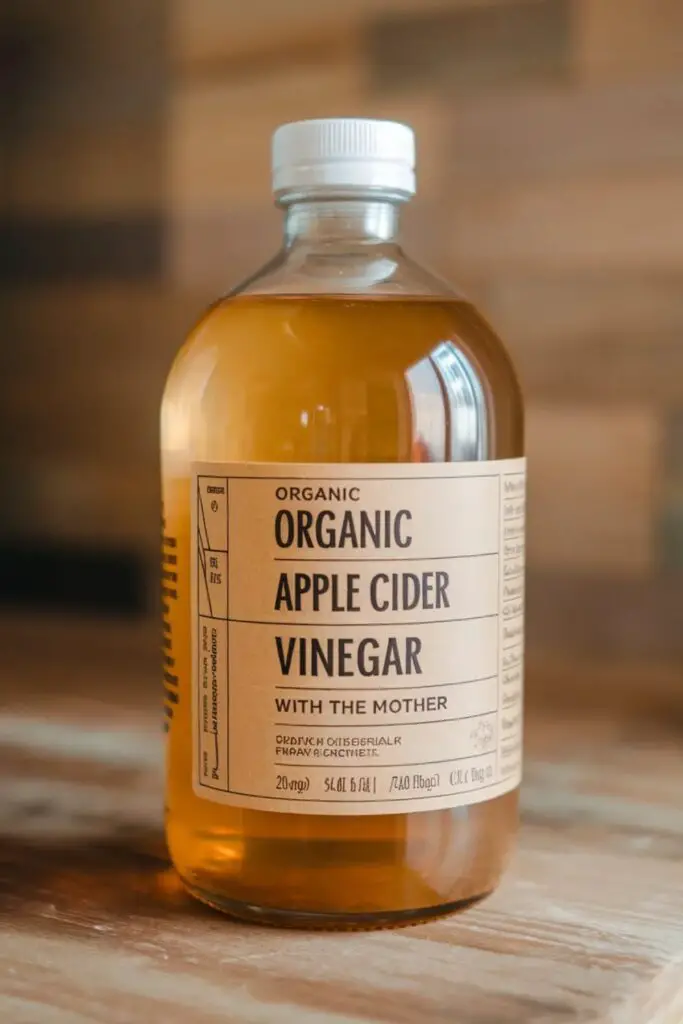
Why It’s Beneficial:
Raw, unfiltered apple cider vinegar (ACV) contains acetic acid, enzymes, and beneficial bacteria, which help balance gut pH, reduce harmful bacteria, and aid digestion. ACV also supports skin health, reduces allergies, and boosts immune function.
How to Use:
- Use organic, raw, unpasteurized apple cider vinegar that contains “the mother,” which holds beneficial probiotics.
- Add ¼ to ½ teaspoon per 20 pounds of body weight to your dog’s food or water once daily.
- ACV can also be used as a topical rinse for skin issues and itchy paws.
Considerations:
- Excessive use may lead to stomach irritation and acidity issues. Always start with small doses.
- Never give undiluted ACV directly; it must always be mixed with food or water.
- Avoid ACV if your dog has a sensitive stomach, kidney disease, or acid reflux.
4. Goat’s Milk
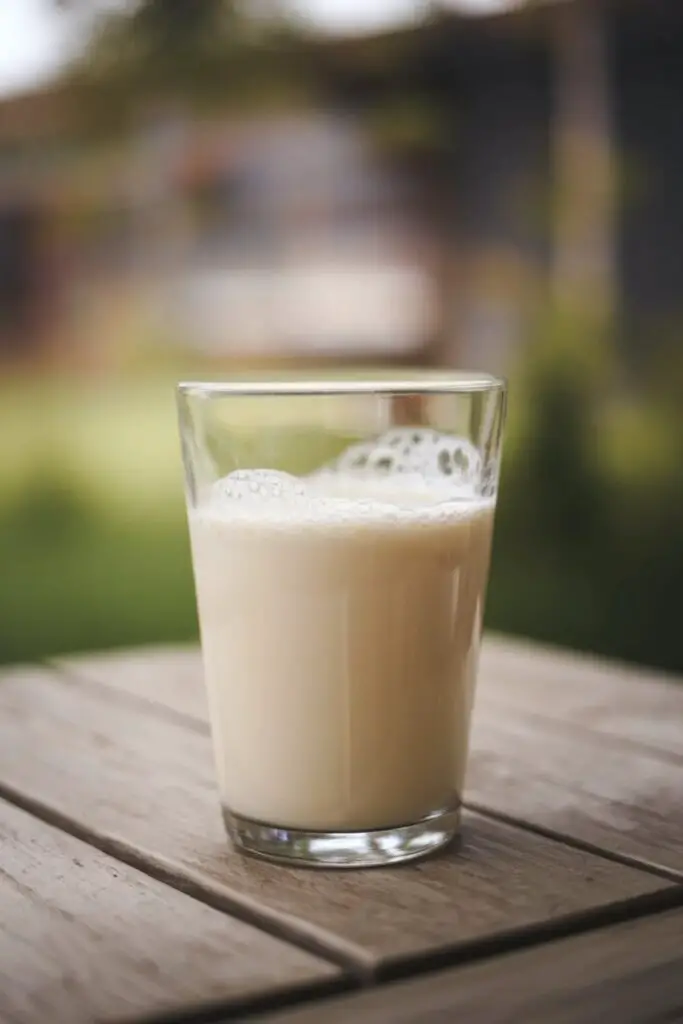
Why It’s Beneficial:
Goat’s milk is an excellent natural probiotic source that is easier to digest than cow’s milk due to its smaller fat molecules and lower lactose content. It contains lactobacilli, digestive enzymes, essential fatty acids, and amino acids, which support gut health, reduce inflammation, and strengthen immunity.
How to Use:
- Choose raw or fermented goat’s milk for maximum probiotic benefits.
- Serve 1-2 tablespoons for small dogs and ¼ cup for large dogs, either as a stand-alone drink or poured over their food.
- Goat’s milk can also be frozen into ice cube trays for a refreshing probiotic treat.
Considerations:
- Although lower in lactose, some dogs may still be sensitive to dairy. Introduce gradually.
- Always buy high-quality, pasteurization-free goat’s milk to ensure the probiotics remain intact.
5. Kombucha (Diluted & Sugar-Free)

Why It’s Beneficial:
Kombucha is a fermented tea rich in probiotics, antioxidants, and organic acids that promote digestion and detoxification. It contains beneficial yeasts and bacteria that help balance gut flora.
How to Use:
- Choose plain, unflavored, and sugar-free kombucha without additives.
- Offer a few teaspoons mixed into food or water a few times per week.
- Alternatively, use kombucha as a base to make frozen probiotic treats.
Considerations:
- Ensure it’s completely caffeine-free, as caffeine is toxic to dogs.
- Avoid store-bought kombucha with high sugar content.
- Only serve in small amounts, as excess fermentation may cause gas or bloating.
6. Probiotic-Rich Bone Broth

Why It’s Beneficial:
Bone broth is not only rich in collagen, gelatin, and amino acids, but when combined with probiotics, it becomes a gut-healing superfood. It helps repair the digestive lining, supports joint health, and improves skin and coat condition.
How to Use:
- Use organic bones (chicken, beef, or turkey) to make homemade broth.
- Simmer the bones in filtered water and apple cider vinegar for 24+ hours to extract nutrients.
- Allow it to cool, then mix in a probiotic source like yogurt or fermented veggies before serving.
- Add 1-2 tablespoons per meal for small dogs and ¼ cup for large dogs.
Considerations:
- Do not use store-bought broths with onions, garlic, excessive salt, or artificial additives.
- Avoid giving cooked bones to dogs, as they can splinter and cause internal injuries.
Why Choose Homemade Probiotics for Dogs?
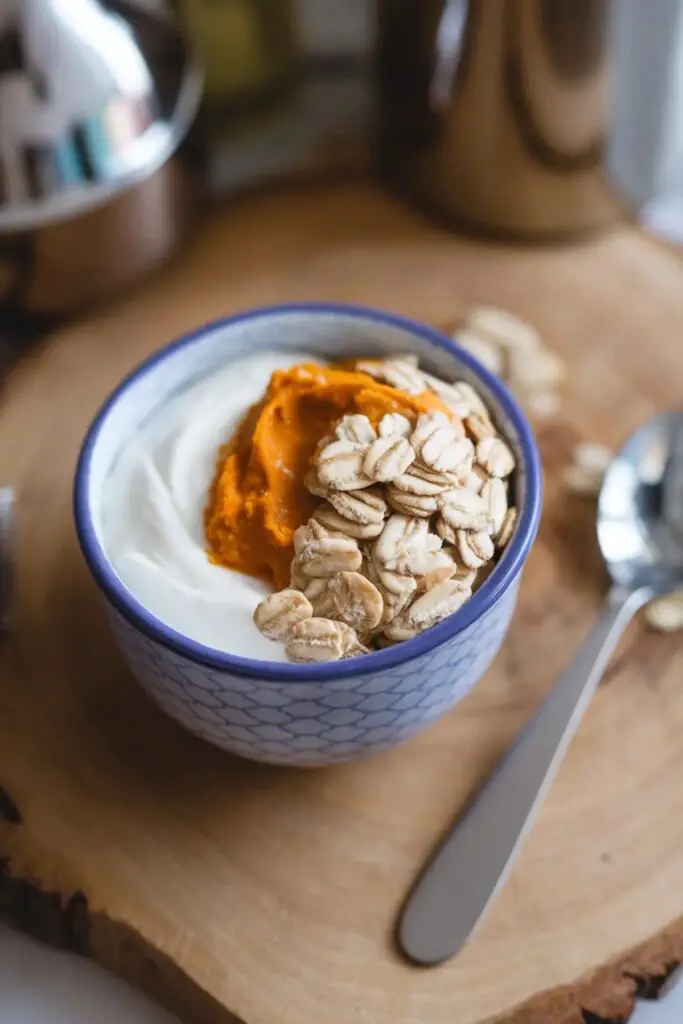
When considering probiotics for your dog, the choice often comes down to store-bought products versus homemade options. While commercial probiotic supplements can be effective, making probiotics at home offers unique advantages that are hard to ignore. By choosing homemade probiotics for dogs, you can ensure quality, save money, and customize the ingredients to suit your dog’s specific needs.
Benefits of DIY Probiotics
- Cost-Effectiveness
- Store-bought probiotics, especially premium-grade ones, can be expensive. By making them at home, you can save money while still providing high-quality gut support for your dog.
- Ingredient Control
- Many commercial probiotic products contain additives, preservatives, or fillers that may not be suitable for all dogs, especially those with allergies or sensitive stomachs. Homemade probiotics let you use simple, wholesome ingredients that are safe and beneficial.
- Customization
- Every dog is unique, and their probiotic needs may differ based on size, age, breed, and health condition. Homemade probiotics allow you to tailor recipes to address your dog’s specific health concerns.
- Natural and Fresh
- Making probiotics at home ensures the product is fresh, active, and free from unnecessary processing. The natural fermentation process also enhances the potency of the probiotics.
Are Homemade Probiotics Safe for Dogs?
Safety is a common concern among pet owners considering homemade probiotics. While these natural remedies are generally safe, certain precautions should be taken:
- Use Dog-Safe Ingredients: Not all foods humans consume are safe for dogs. For example, garlic and onions—sometimes used in human probiotic recipes—are toxic to dogs. Stick to dog-friendly options like yogurt, kefir, and pumpkin.
- Monitor Portion Sizes: Overconsumption of probiotics can lead to side effects like gas or diarrhea. Start with small amounts and gradually increase if your dog tolerates it well.
- Hygiene Matters: Ensure all equipment used in fermentation or preparation is clean to avoid contamination.
Expert Tip:
“Introducing probiotics gradually is key. Start with small doses and observe your dog’s response for a week. If no adverse effects occur, you can slowly increase the serving size.” – Dr. Karen Becker, Integrative Veterinarian.
Common Mistakes to Avoid When Making Homemade Probiotics
- Over-Fermentation: Letting foods ferment too long can result in overly sour or unpalatable probiotics that your dog may reject.
- Using Artificial Ingredients: Avoid sweeteners, artificial flavors, or colors that can harm your dog’s health.
- Ignoring Storage Guidelines: Homemade probiotics must be stored properly to maintain their effectiveness. Refrigeration is usually necessary for live cultures.
- Skipping Veterinary Advice: Always consult your vet before introducing new foods or supplements to your dog’s diet, especially if they have pre-existing health conditions.
Comparison: Homemade vs. Store-Bought Probiotics
| Factor | Homemade Probiotics | Store-Bought Probiotics |
| Cost | Affordable, uses common ingredients. | Can be expensive, especially premium brands. |
| Customization | Fully customizable to your dog’s needs. | Pre-formulated, limited flexibility. |
| Additives | Free of fillers, preservatives, and artificial ingredients. | May contain unwanted additives or preservatives. |
| Potency | Fresh and active, though harder to measure exact CFU count. | Lab-tested for potency with CFU count provided. |
How to Incorporate Probiotics into Your Dog’s Daily Routine
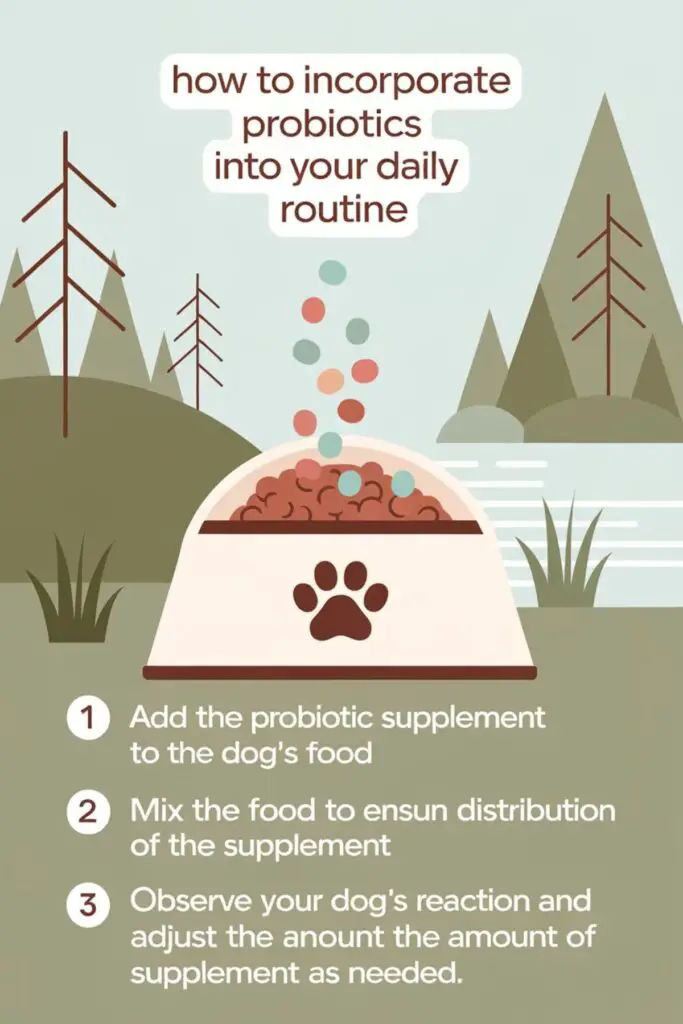
Adding probiotics to your dog’s diet can be simple and rewarding. Whether you’re introducing fermented vegetables or yogurt, consistency is key. Here’s how to seamlessly include probiotics in their daily meals:
1. Start Slowly
Introducing probiotics gradually is crucial to avoid overwhelming your dog’s digestive system.
Tips for Starting:
- Begin with small portions, such as a teaspoon of yogurt or a few pieces of fermented vegetables.
- Observe your dog’s reaction for any signs of discomfort like gas or loose stools.
- Gradually increase the quantity over a week to the recommended serving size.
2. Use Probiotics as a Meal Topper
One of the easiest ways to introduce probiotics is by adding them to your dog’s regular food.
Suggestions:
- Mix yogurt, kefir, or a small amount of fermented vegetable juice into kibble or wet food.
- Add a dollop of probiotic pumpkin mash as a topper for added flavor and nutrition.
- Rotate different types of probiotics throughout the week to provide a variety of beneficial bacteria.
3. Offer Probiotic Treats
Probiotic-rich snacks are a fun and effective way to boost your dog’s gut health.
Ideas:
- Freeze yogurt and banana treats for a refreshing reward.
- Use bone broth probiotic cubes as an afternoon snack.
- Serve fermented vegetables as a crunchy side during meals.
4. Incorporate into Specific Meal Times
To establish a routine, incorporate probiotics into a specific daily meal.
Example Routine:
- Morning: Add a spoonful of plain kefir to breakfast.
- Afternoon: Give a bone broth probiotic cube as a snack.
- Evening: Mix a small portion of fermented vegetables with dinner.
Pro Tip: This routine can help dogs with regular digestion issues, as probiotics are most effective when given consistently.
5. Use Probiotics During Stressful Periods
Stressful situations, like travel or illness, can disrupt your dog’s gut microbiome. Probiotics can help mitigate these effects.
When to Increase Probiotic Intake:
- During travel or boarding.
- After completing a course of antibiotics.
- During transitions to a new diet or home.
How to Adjust: Offer probiotics twice a day instead of once to restore gut balance more effectively.
6. Monitor Your Dog’s Response
Every dog reacts differently to probiotics, so monitoring their health is essential.
Signs of Improvement:
- Regular, firm stools.
- Reduced gas or bloating.
- Increased energy levels and better appetite.
Signs to Watch For:
- Persistent diarrhea or discomfort.
- Allergic reactions like itching or swelling.
- Loss of appetite (consult your vet if symptoms persist).
7. Consult Your Veterinarian
If you’re unsure about the right type or amount of probiotics, consult your veterinarian for personalized advice.
What to Discuss:
- Your dog’s age, weight, and activity level.
- Any existing health conditions or dietary restrictions.
- Appropriate probiotics for specific issues like allergies or chronic digestive problems.
Quick Tips for Success
| Tip | Why It’s Important |
| Start with small amounts | Prevents digestive upset during transition. |
| Be consistent | Ensures long-term benefits for gut health. |
| Rotate probiotic types | Offers diverse strains of beneficial bacteria. |
| Monitor your dog’s response | Helps identify what works best for your dog. |

Hi, I’m Ali Tarek, the founder of Animalsman. I’ve always been passionate about pets, especially dogs and cats, and I created this website to share practical tips, easy recipes, and helpful care advice for fellow pet lovers. My goal is to make pet care simple, enjoyable, and accessible for everyone. When I’m not writing or curating content, you’ll usually find me spending time with my furry friends or learning new ways to keep them happy and healthy.

